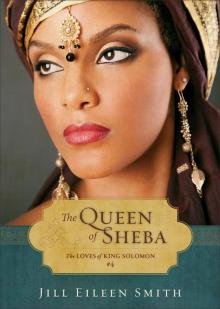Sarai Read online
© 2012 by Jill Eileen Smith
Published by Revell
a division of Baker Publishing Group
P.O. Box 6287, Grand Rapids, MI 49516-6287
www.revellbooks.com
Ebook edition created 2012
All rights reserved. No part of this publication may be reproduced, stored in a retrieval system, or transmitted in any form or by any means—for example, electronic, photocopy, recording—without the prior written permission of the publisher. The only exception is brief quotations in printed reviews.
ISBN 978-1-4412-3603-6
Library of Congress Cataloging-in-Publication Data is on file at the Library of Congress, Washington, DC.
Scripture quotations are from the Holy Bible, New International Version®. NIV®. Copyright © 1973, 1978, 1984 by Biblica, Inc.™ Used by permission of Zondervan. All rights reserved worldwide. www.zondervan.com
This is a work of historical reconstruction; the appearance of certain historical figures is therefore inevitable. All other characters, however, are products of the author’s imagination, and any resemblance to actual persons, living or dead, is coincidental.
Published in association with the Books & Such Literary Agency, 52 Mission Circle, Suite 122, PMB 170, Santa Rosa, CA 95409-5370, www.booksandsuch.biz.
“Jill Eileen Smith’s Sarai gives ‘the rest of the story’—Abram and Sarai’s journey toward faith. Don’t hesitate to open this rich biblical drama for new insight and a new perspective on the patriarch and his family. A well-written story filled with human emotion.”
—Lyn Cote, author of Her Abundant Joy
“What a marvelous retelling of an old and sacred story! Though I knew it well, I could not put Sarai down. Smith takes us into the minds of the characters as they struggle with their flaws, fears, and disappointments, armed only with an often fragile faith. Sarai is an inspiring offer of hope for all.”
—Linda Windsor, author of the Brides of Alba series
“Jill Eileen Smith’s research shines in this gem of a novel detailing the lives of Abram and Sarai. Fans of biblical fiction will be delighted by Smith’s retelling of two of the most beloved personalities from the book of Genesis.”
—Kacy Barnett-Gramckow, author of the Genesis Trilogy
“I’ve read Jill Eileen Smith’s writing with great interest since before she was published, and I’ve enjoyed watching this talented woman be discovered as a powerful novelist. Jill has a special insight into her characters and a great love for biblical stories. I highly recommend her latest novel, Sarai. You will not be disappointed.”
—Hannah Alexander, award-winning author of Eye of the Storm
“In Sarai, Jill Eileen Smith takes the reader back to ancient times and the nomadic life of Sarai and Abram. This is an absorbing visit to the past, filled with wonderful details and fascinating characters, including Abram’s nephew Lot and his wife. Smith reveals timeless doubts and struggles, along with the triumphs of some and the ill-fated but fascinating paths of others. Remarkable research is folded into a story that builds to an unforgettable ending. Smith truly brought the era to life!”
—Maureen Lang, author of Springtime of the Spirit and Whisper on the Wind
Contents
Cover
Title Page
Copyright Page
Endorsements
Dedication
Prologue
Part 1
1 2 3
4 5 6
7 8 9
10 11 12
13 14 15
16
Part 2
17 18 19
20 21 22
23
Part 3
24 25 26
27 28 29
30 31 32
Part 4
33 34 35
36 37
Note from the Author
Acknowledgments
About the Author
Books by Jill Eileen Smith
Back Ads
Back Cover
To my dad, who longed for a better country—a heavenly one—a city with foundations, whose architect and builder is God (Heb. 11:10, 16).
In Loving Memory
of
Leonard C. Smith, Jr.
1922–2011
Prologue
Ur, 2051 BC
Sarai glanced across the courtyard, catching Abram’s gaze. His half smile and the twinkle in his eye warmed her more than the wine she had tasted at the start of the ceremony. Music drifted around them as the bridal couple—their nephew Lot and his new wife, Melah—took their seats on the bench beneath the canopy and accepted rich foods from the hands of the servants.
“This whole wedding is a disgrace, you know.” Sarai’s sister-in-law Milcah stood at her elbow and leaned close to her ear. “Why her father agreed to the marriage after Lot had already humbled the girl . . . Though I suppose he didn’t have much choice. Who else would want her after she’d already given in to Lot’s charms?” Milcah batted at a fly, sending it away. “I can’t imagine why Lot couldn’t wait with such a one. It’s not as though she’s a beauty or a temptress. It seems like he could have done better.” The last words came out in a whisper as Milcah moved in close again.
Sarai turned from watching the bridal couple to meet Milcah’s pinched gaze. “If it is true that a babe is already on the way, it is better they marry.” She had wearied of the heated debate and shame Lot had brought down on her household, particularly on Abram.
“Abi Terah seems pleased with the arrangement.” Milcah touched Sarai’s shoulder and pointed toward their father. “Though his conditions did seem a little harsh toward Lot, while Melah came away already with child and married to a man who can never put her aside or take another. I might have given in to Nahor before our betrothal for such a promise.” She laughed at that, then shifted her ample bulk, bursting with child herself, to face Sarai once more.
Sarai stifled her hurt at the critical words, remembering her own wedding promises, hers and Abram’s. She smoothed imaginary wrinkles from her skirts and avoided Milcah’s perusing gaze.
“I see I have upset you.” Milcah patted Sarai’s arm. “Your time will come, Sarai. At least you can rest in knowing Abram loves you. If he didn’t, he might have broken his vow to you long ago.” She placed a protective hand over her middle and shook her head, her gaze pitying, though Sarai sensed, as she always did, a hint of arrogance in Milcah’s tone. The beautiful Sarai was barren. She’d become a fool. A laughingstock.
She clenched her jaw and held herself erect, lifting a jeweled hand to her throat. “Thank you, Milcah.” She forced a smile. “If you will excuse me, I must check on the food.” She glided away from the bench along the courtyard wall, skirted the crowds, and hurried into the house, the vows at her own wedding feast suddenly sharp in her ear.
“I promise never to take another wife,” Abram had said, his gaze full of love for only her.
“I promise to give you a child.” Sarai had gazed into his handsome face, her heart doing a little dance at having finally convinced her father to let them marry.
“I hold you, my son Abram and my daughter Sarai, to your promises this day. If you, Sarai, do not fulfill your vow to my son, his vow to you is null.” Her father’s unwavering gaze had held her fast.
How easy such a promise had seemed then.
But after thirty-two years of marriage, she had yet to conceive. And here Melah was already with child even before her wedding day. She blinked back stinging tears. Conversations and laughter filtered through the open windows while a harpist played quiet music in the background. After the meal, there would be singing and dancing, and guests would remain until well past nightfall, only to return again on the morrow for several more days of feasting.
&nbs
p; She rested her head against the cool limestone wall aligning the comfortable sitting room, unobserved by the servants as they rushed down the halls from the cooking rooms with platters piled high with food. She had no reason to be jealous. She was mistress of a wealthy estate, wife to one of Ur’s finest nobles, whose father had long held the king’s ear. A princess of Ur, if ever there was one.
But she could not stop the pain Milcah’s presence always evoked. Milcah already had one son who had weaned only three months before. She did not deserve another so soon.
“I thought I might find you here.” At Abram’s voice and his touch on her shoulder, she turned into his comforting embrace. “What’s wrong, dear one?”
Sarai released a troubled sigh and leaned back to better see his face. “Milcah.”
He nodded, but at his quizzical look, she knew he did not understand.
“She is flaunting her swollen belly, and I have no patience for her criticisms.”
“Ah,” he said, pulling her close again. “Milcah is jealous of your beauty, dear wife. She has nothing else to flaunt.” He patted her back, but the action did not soothe.
“I would rather have a child than beauty.” The words were a mere breath against his chest, but when his hands stilled, she knew he’d heard.
“And I would rather have you just as you are.” He held her at arm’s length, his gaze searching. “Do not trouble yourself or deny joy to others, dear one. You have nothing to fear.”
She looked into his handsome face and cupped his bearded cheek with her hand. He still carried the vigor of one much younger, and she rested in his strength as he held her. “But I do fear, dear husband. I fear I have failed to give you what you most deserve. Perhaps if I had been as Melah, you would already have a son.”
“I deserve nothing, Sarai. What I possess is only a gift. Adonai will give what He will.” He lifted her chin to look into her face. “Lot will have to live with his errors the rest of his days. Trust me in this, Sarai. A man who takes a woman before the proper time lives with long regrets, whether he realizes it or not.”
“Do you think Lot regrets marrying Melah?” she whispered. Abram often had Lot’s ear, and Abram had given the younger man a scathing lecture after the truth had come out.
“Lot is too brash and too charming, though he did repent of his act and agree to the marriage. But then, Father gave him no choice. He would have lost any inheritance if he had refused. Father has his honor.”
“Lot should have had his own.” Sarai looked into her husband’s loving gaze, grateful all over again for such a man. A man whose character surpassed most men in the city, even those in her own family. A man who had earned her devotion and her respect.
Abram bent to give her a gentle kiss. “Come, sit with me at the feast. You need not endure Milcah’s pity on such a day.”
Tears rose again at his kindness, at how astute he could be to her emotions. He brushed the tears from her cheeks and slipped her hand in his. “Do not fear, Sarai. In His time, Adonai will give us a son. And if He does not, we will discuss what to do about it then.”
She nodded, following his lead as he guided her back through the house to the courtyard. But as the music played around her and the well-wishers shouted blessings of fertility to the bride and groom as they entered the sparkling bridal tent, Sarai could not stop the worry or the fear.
How flippantly she had promised her husband a child in order to convince her father to give her to Abram.
She did not know how much that vow would cost her then.
And how impossible it all was now.
Part
1
Terah became the father of Abram, Nahor and Haran. And Haran became the father of Lot. While his father Terah was still alive, Haran died in Ur of the Chaldeans, in the land of his birth. Abram and Nahor both married. The name of Abram’s wife was Sarai, and the name of Nahor’s wife was Milcah; she was the daughter of Haran, the father of both Milcah and Iscah. Now Sarai was barren; she had no children.
Genesis 11:27–30
The Lord had said to Abram, “Leave your country, your people and your father’s household and go to the land I will show you. . . .”
So Abram left, as the Lord had told him; and Lot went with him.
Genesis 12:1, 4
1
Fifteen Years Later
Sarai looked up at the great ziggurat of Nannar and took a step backward, overwhelmed as she always was at the enormity of the temple to Ur’s patron god. The steps rising upward, forever upward, drew her gaze to the triangular peak, its god’s-eye view gazing down at her, watching. She shivered, certain the feeling came from more than the soft breeze blowing down from the north.
Abram would not approve of her being here. Even protected by her male slaves and accompanied by her maid, Lila, her niece Melah, and her servants, Abram would still consider Ur unsafe for his beautiful wife. And if he knew her reason . . .
Why had she come?
“Did you bring the likeness?” Melah stopped on the cobbled street and turned to look at her. Her niece’s face, still rosy with the freshness of youth yet well tanned by the sun, held a glint of excitement.
“It’s here.” Sarai patted the pouch at her side, tucked into the pocket of her robe. “But I still don’t see what good this will do.”
The image was carved of olive wood, a pregnant likeness of Sarai with crescent moons—symbols of the god—painted into the clothing designs. But could the gods really give Sarai the child she craved or the son Melah longed for—one who would live? While Abram’s brother’s sons lined his table like olive plants sprung up beneath an ancient flowering tree, Abram’s own table stood quiet, empty.
Sarai would sacrifice her beauty to fill that void, to give Abram a son.
Melah frowned, crossed her arms over her chest. “It won’t do any good at all if you don’t believe, Sarai.” Her gaze dropped to Sarai’s flat stomach. “Obviously you need help.”
“Obviously.” She couldn’t keep the sharpness or the sarcasm from her tone, especially in front of this upstart niece, or the pang of guilt and sadness from piercing her heart.
“Nevertheless, you should have done this years ago.” Melah’s patronizing tone made Sarai bristle. “You can’t ask others to do the sacrificing and petitioning for you. The goddess wants your devotion. If you want a child, you must worship the mother goddess. For even Inana came by her fertile power through her mother Ningal. You’ve known this since childhood.” Melah turned, then looked back again. “Of course, if you’d prefer Inana’s fertility rites . . .” She smirked as though the thought amused her, whether because she disdained Abram’s faith or because she could not imagine Sarai submitting to Inana’s sexual practices. Probably both, considering Melah’s blatant interest in the love goddess and her impassioned ways.
Sarai lifted her chin and tilted her gaze away from Melah. She nodded to her slaves and continued around the ziggurat to the streets behind until she came upon the courtyard fencing in Ningal’s temple. Columns stood on either side of the gate with steps leading to two great, sculpted doors, where bulls carved into the wood gave silent otherworldly protection to all who dwelled therein. Incense, the breath of the gods, burned spicy-sweet in tall sconces on either side of the doors, where real guards in bronze helmets and brass greaves held tall spears at attention. From their vantage point, they saw every movement in the courtyard.
Sarai stared at the scene, taking in the gleaming gilded columns. The dappled light made the bulls appear to move, their horns bent forward as though to strike. The temple seemed to pulse with its own breath, making Sarai’s catch in her throat. Her sandals felt suddenly weighted, stuck to the stones like dried mud to baked bricks.
She shouldn’t be here.
“Are you ready?”
Sarai slipped a hand over the image in her pocket and slowly turned to look at her niece, the wooden image burning the flesh of her palm as though heated by the sun’s sharp rays. Had Ningal’s son Utu come
to block their path? The gods were always bickering over one thing or another. Perhaps the sun god did not want them to pay homage to his mother. And what if Melah was right? Inana was the goddess of love. Was she the one who could answer Sarai’s prayers for a child? But the rituals involved . . .
She shook her head, releasing her grip on the image and letting the pouch hang from the belt at her side. Never! She would not resort to such practices, even if she paid someone else to do them for her. Still, Ningal did not exact such a cost.
She looked at Melah. “I . . .” She what? Words would not form. What did she want but a child? But was this the best way?
“I didn’t come all this way to have you change your mind on me, Sarai. Do you want to keep your vow to Abram or not?” Melah flicked a gaze in Lila’s direction. “Or perhaps you should just give him your maid and be done with it.” Her scowl drew her narrow eyes into slits, making her forty-plus years look far older than Sarai did at twenty years her senior.
“Abram wouldn’t hear of such a thing.” She lifted her chin, but the action was more to put Melah in her place than to assert her confidence. If Abram knew where she stood right now, what she was about to do . . . might he take another wife? She glanced at Lila, who had become more like a daughter than a maid to her. Abram would never agree to such a thing.
The sundial in the courtyard moved a notch, and Sarai glanced at the sky. Clouds skimmed the surface of blue, pushed along by the increasing breeze. She braced herself, her hand closing over the pouch with the image once more. She must act, one way or the other.

 Star of Persia: Esther's Story
Star of Persia: Esther's Story The Shepherdess
The Shepherdess Abigail (The Wives of King David Book #2): A Novel
Abigail (The Wives of King David Book #2): A Novel The Queen of Sheba
The Queen of Sheba Michal
Michal Rebekah
Rebekah A Passionate Hope--Hannah's Story
A Passionate Hope--Hannah's Story Daughter of the Nile
Daughter of the Nile Rachel
Rachel Sarai
Sarai Redeeming Grace: Ruth's Story
Redeeming Grace: Ruth's Story The Desert Princess
The Desert Princess The Prophetess - Deborah's Story
The Prophetess - Deborah's Story